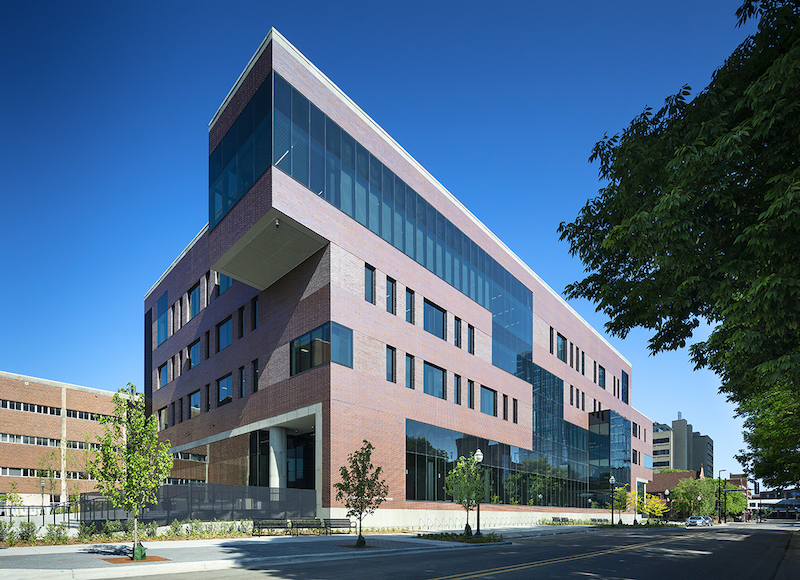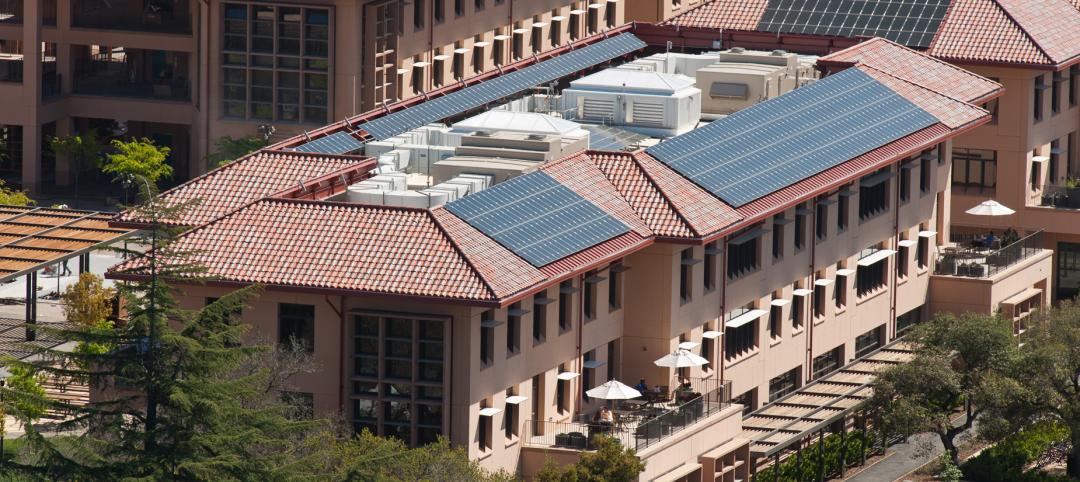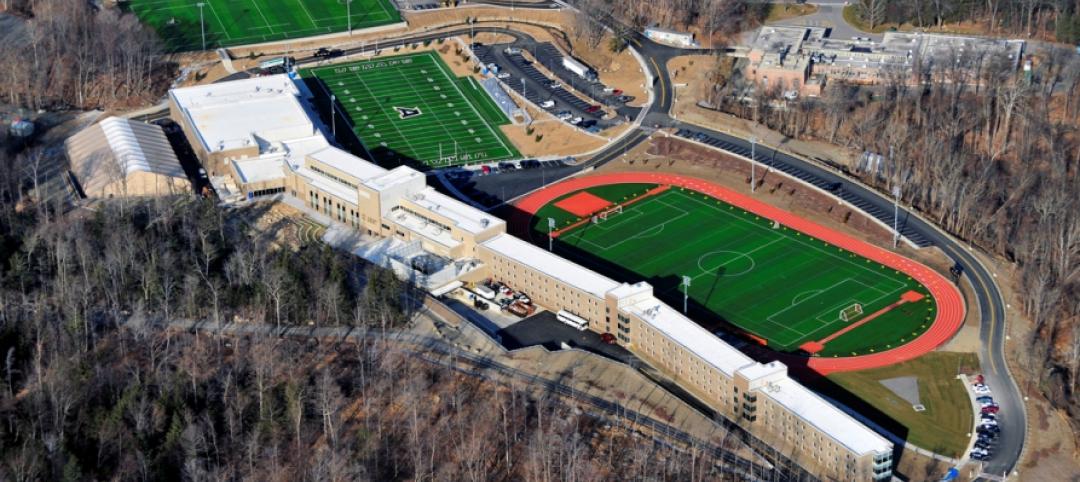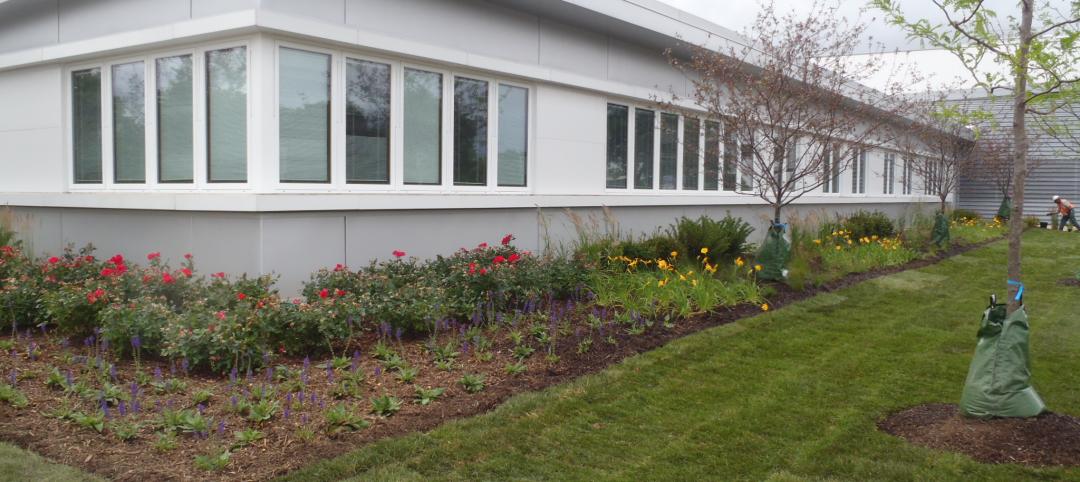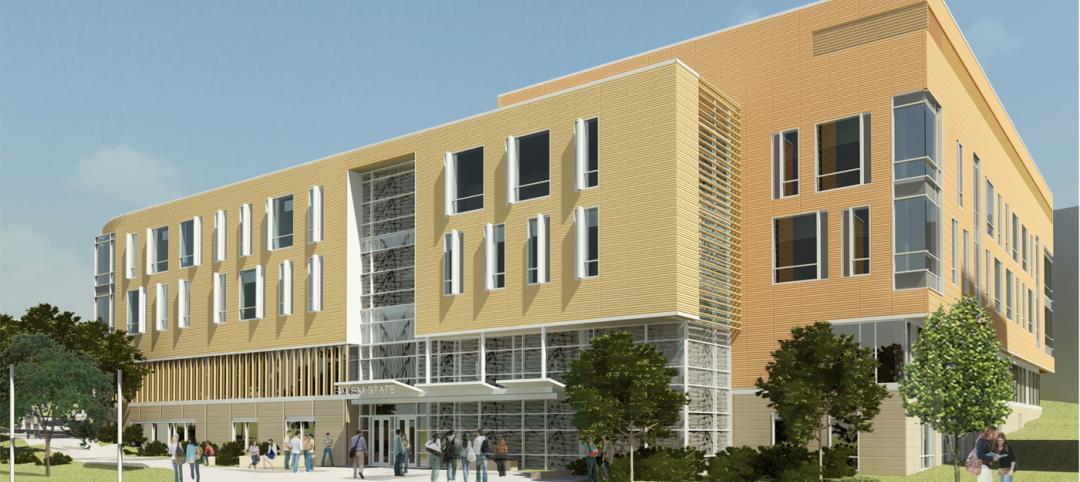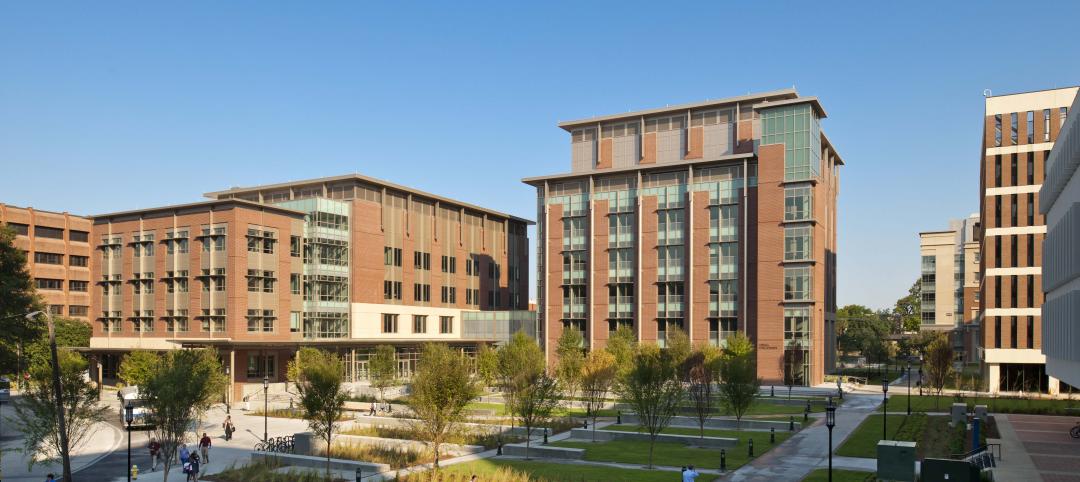The University of Minnesota alumni account for more than 70% of that state’s health professionals. To help prepare the next generation, the university’s Twin Cities campus recently debuted its Health Sciences Education Center, a hub for UM’s health professional schools, and designed to promote interprofessional education and interaction that prioritizes student and faculty well-being.
The 202,000-sf Education Center is positioned to be one of the more comprehensive interprofessional facilities in the country. The project entailed six stories of new construction, and four stories of renovation of an adjacent building. The two structures are connected by portals on four floors.
“The new Health Sciences Education Center is much more than a building; it is a catalyst for change as we prepare the next generation of health care professionals,” says Mark Rosenberg, MD, Vice Dean for education and academic affairs in the Medical School.
Early examples of the Center’s multipurpose utility and transformative potential were evident last summer, when HSEC was used in collaboration with the School of Public Health, Medical School and the Medical Reserve Corps to assist the Minnesota Department of Health in COVID-19 contact tracing. M Simulation—a university team that designs and delivers training experiences for health science students and other stakeholders—also used HSEC’s spaces to train incoming residents and students on personal protective equipment in clinical environments.
REAL-LIFE TRAINING IS PART OF PROGRAMMING
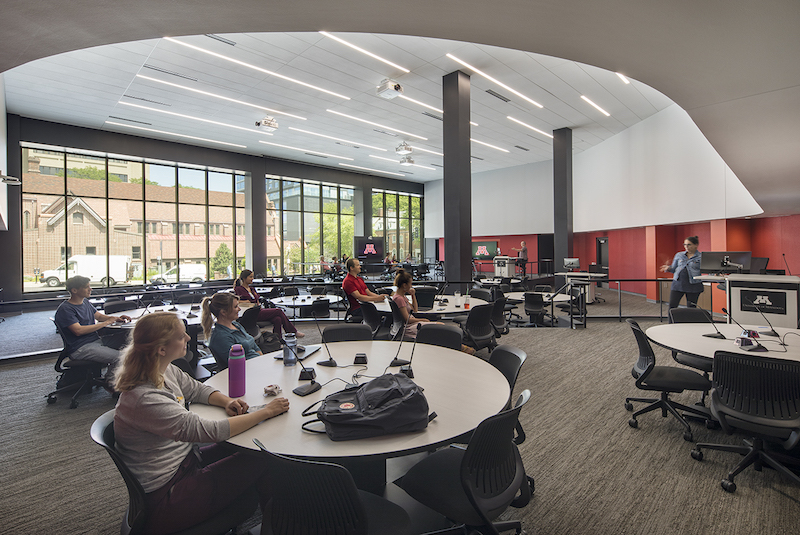
The new HSEC has space for small and large group learning and instruction. Images: Lara Swimmer
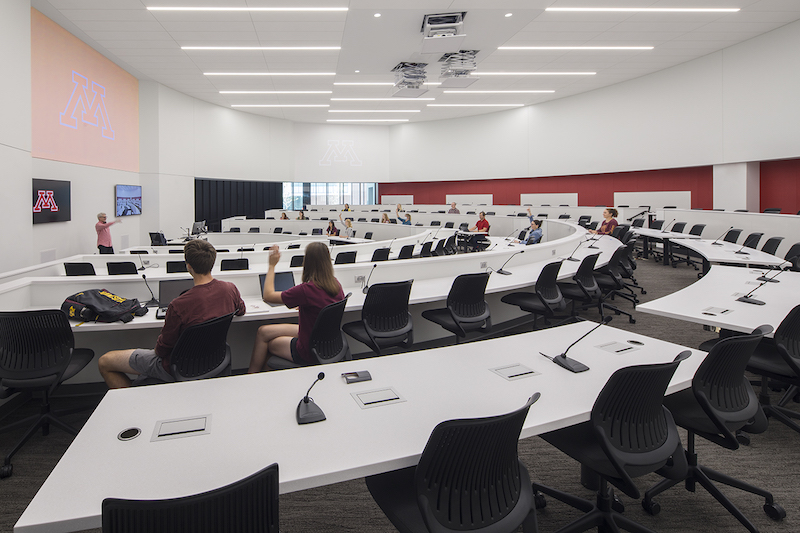
The new HSEC includes:
Center for Health Interprofessional Programs, which connects health professions students from varying disciplines, allowing them to collaborate, network, socialize, and learn;
Biomedical Library and Wangensteen Historical Library of Biology and Medicine, which connects students to healthcare’s history and opportunities for invention and product development that might define the industry’s future, including a makerspace and virtual reality studio;
Simulation Labs on two floors that connect students to the patient experience and the reality of working alongside their interdisciplinary peers. Jakub Tolar, Dean of UM’s Medical School and Vice President of its Office of Academic Clinical Affairs, explains that these labs help prepare students for real-life medical events and crisis, for which “you have to train yourself, almost like an athlete.”
The S/L/A/M Collaborative and Perkins and Will were co-design architects on HSEC. SLAM led this project’s program validation, utilization analysis, building planning, and the documentation of all classrooms, immersive learning environments, and administrative spaces. Perkins and Will, as AOR, provided the exterior and massing design, interior finishes and furniture selection, and public/social space documentation. The Building Team included JE Dunn (GC), IMEG (MEPF), Palanisami & Associates (SE), EVS Inc. (CE), and Sextant (AV consultant).
IN WITH THE NEW
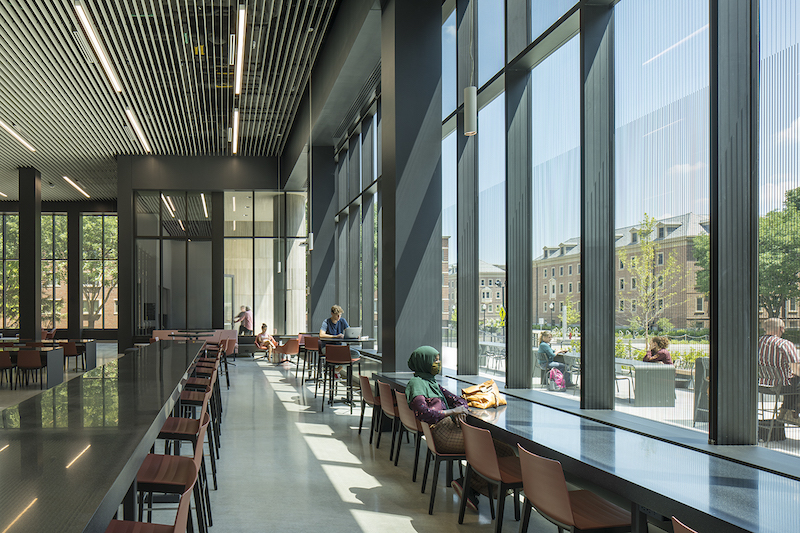
The building's lobbies (above) have lots of seating and natural light. The Center's library features makerspaces and virtual studios. Images: Lara Swimmer, SLAM
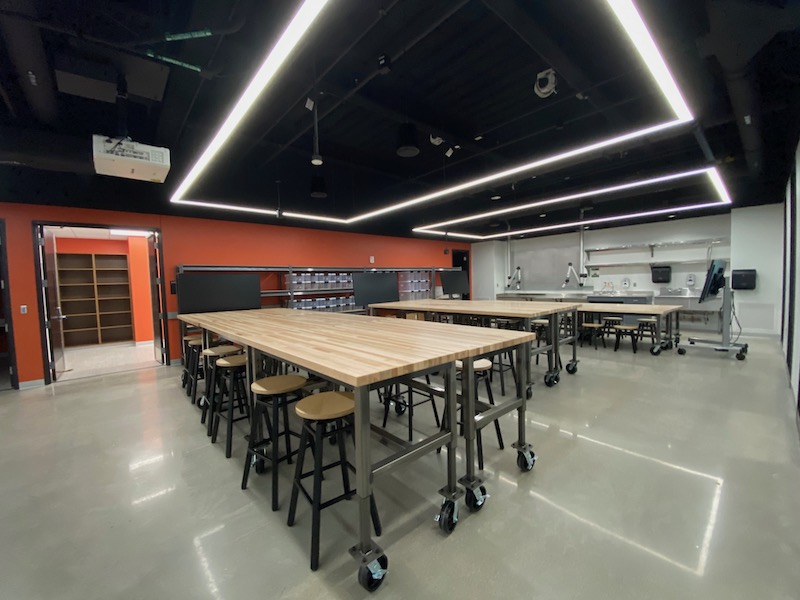
HSEC, which broke ground in February 2018, replaces a four-story brick structure, called the VFW Cancer Research Center and Masonic Memorial Building, that was completed in 1957. The renovated space in the Phillips Wangersteen Building replaces underutilized clinics.
The State of Minnesota invested $66.7 million in construction as part of its 2017 special session bonding bill. The University, along with support from donors, funded an additional $33.3 million in construction costs. Predesign and design from reallocated TCF Bank Stadium bond proceeds totaled $8.6 million. The total cost of the project is $108.6 million, according to the university.
Related Stories
| Mar 20, 2012
Stanford’s Knight Management Center Awarded LEED Platinum
The 360,000-sf facility underscores what is taught in many of the school’s electives such as Environmental Entrepreneurship and Environmental Science for Managers and Policy Makers, as well as in core classes covering sustainability across the functions of business.
| Mar 19, 2012
HKS Selected for Baylor Medical Center at Waxahachie
Baylor Medical Center at Waxahachiewill incorporate advanced technology including telemedicine, digital imaging, remote patient monitoring, electronic medical records and computer patient records.
| Mar 14, 2012
Tsoi/Kobus and Centerbrook to design Jackson Laboratory facility in Farmington, Conn.
Building will house research into personalized, gene-based cancer screening and treatment.
| Mar 6, 2012
EwingCole completes first design-build project for the USMA
The second phase of the project, which includes the academic buildings and the lacrosse and football fields, was completed in January 2012.
| Mar 6, 2012
Joliet Junior College achieves LEED Gold
With construction managed by Gilbane Building Company, Joliet Junior College’s Facility Services Building combines high-performance technologies with sustainable materials to meet aggressive energy efficiency goals.
| Mar 1, 2012
Cornell shortlists six architectural firms for first building on tech campus
Each of the firms will be asked to assemble a team of consultants and prepare for an interview to discuss their team’s capabilities to successfully design the university’s project.
| Mar 1, 2012
Bomel completes design-build parking complex at U.C. San Diego
The $24-million facility, which fits into a canyon setting on the university’s East Campus, includes 1,200 stalls in two adjoining garages and a soccer field on a top level.
| Feb 28, 2012
Salem State University Library & Learning Commons topped off
When it opens to students in the fall of 2013, the $60 million facility will offer new archival space; circulation and reference areas; collections; reading spaces; study rooms; instruction labs and a Dean’s suite.
| Feb 28, 2012
Griffin Electric completes Medical University of South Carolina project
The 210,000-sf complex is comprised of two buildings, and houses research, teaching and office areas, plus conference spaces for the University.
| Feb 14, 2012
Angelo State University opens doors to new recreation center expansion
Designed by SmithGroup, the JJR_Center for Human Performance offers enhanced fitness options, dynamic gathering space.


